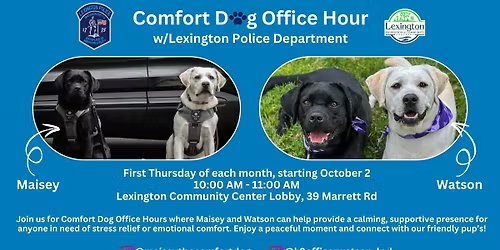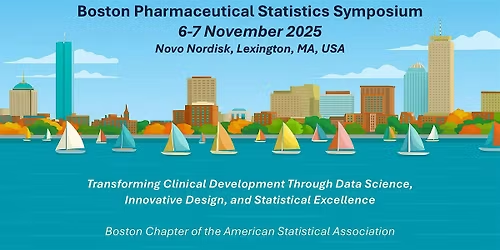
About this Event
Tickets on this page are for virtual attendees of the short courses. To attend the courses in person, use instead. Tickets for the main event on November 7 can be found on .
All participants must register by Friday, October 31, 12 pm EST. The registration fee covers short course materials.
Please note: Valid photo ID is required at registration and must be presented to the Novo Nordisk security. Requirements to enter Novo Nordisk buildings are subject to change.
Join us at the 2025 Boston Pharmaceutical Statistics Symposium on November 6-7, hosted by the Boston Chapter of the American Statistical Association (BCASA). The 2025 symposium theme is Transforming Clinical Development Through Data Science, Innovative Design, and Statistical Excellence. This annual event, held at Novo Nordisk, 75 Hayden Avenue, offers a unique platform for sharing cutting-edge statistical applications and research in the biotech-pharma industry.
It's an ideal opportunity for industry statisticians, academics, students, and professionals interested in pharmaceutical statistical topics to connect and exchange insights within Greater Boston's thriving pharmaceutical community. The symposium features a full day of engaging activities, including thought-provoking invited talks, a dynamic poster session, and ample networking opportunities. Two short courses will be offered on November 6, one day before the main symposium.
Don't miss enhancing your knowledge and expanding your professional network. Mark your calendar now and be part of this impactful event!
Short courses:
- 9 am - 12 pm: TMLE in Drug Development by Susan Gruber, PhD
- 12 pm - 1 pm: Lunch break
- 1 pm - 4 pm: An Overview of Machine Learning Methods for Survival Data by Haolin (Leo) Li, PhD
Abstracts
TMLE in Drug Development by Susan Gruber, PhD
Assessing the risks and benefits of pharmaceutical products involves analyzing data that arise over time collected in a clinical study, during routine medical encounters, or from patient reports. There are barriers to effective analysis of randomized controlled trial (RCT) when sample size is small, outcomes are rare, or intercurrent events disrupt the ability to capture the outcome under the treatment of interest. Additional complications arise when Incorporating real-world data (RWD). Targeted Learning (TL) was designed to address each of these challenges. This course will present the Targeted Learning (TL) estimation roadmap for causal inference, with applications to both RCTs and RWE studies. Targeted maximum likelihood estimation (TMLE) and Super Learner, a general machine learning approach, will be introduced. Case studies will illustrate their application in a variety of areas of medical product development.
An Overview of Machine Learning Methods for Survival Data by Haolin (Leo) Li, PhD
Machine learning methods have become increasingly important tools for analyzing survival data, offering flexible alternatives to traditional statistical models. This short course provides a practical and accessible overview of modern approaches, with an emphasis on big-picture understanding rather than technical detail. Topics include evaluation metrics such as the integrated Brier score (IBS) and concordance index (C-index), along with methods ranging from penalized regression and survival trees to ensemble approaches such as random survival forests, gradient boosting machine, and super learning. We will also introduce deep learning methods for survival outcomes. Real-world case studies with computing code will illustrate applications.
The course is intended for participants with prior working knowledge of survival analysis (e.g., Kaplan–Meier estimation, logrank test, and Cox proportional hazards model) who want a broad overview of machine learning methods in this area.
About the instructors:
Haolin (Leo) Li, PhD is an Assistant Professor of Biostatistics at the Boston University School of Public Health. His research areas include survival analysis, machine learning, clinical trials, study design, and data synthesis. Dr. Li’s work focuses on developing and applying advanced statistical and machine learning methods in studies with outcome-dependent sampling designs. He also conducts research in data synthesis and subgroup analysis in clinical trials, biomarker-integrated clinical trial design, and statistical methods for complex survey data. He is also actively involved in interdisciplinary collaborations, particularly in epidemiological and biomedical research.
Susan Gruber, co-founder of software start-up TL Revolution, is a biostatistician and computer scientist who is working to providing accessible, expert-driven tools for targeted learning. She previously founded Putnam Data Sciences, a statistical consulting firm specializing in causal inference and predictive modeling to support public health and regulatory decision making. In addition to leading and collaborating on FDA-funded projects to improve evaluation of drug safety and effectiveness, Dr. Gruber developed the first open source R package for TMLE and has an extensive record of publications, presentations, and workshops on Targeted Learning.
More information on the 2025 Boston Pharmaceutical Statistics Symposium can be found on our website.
Our Sponsors
We thank our colleagues at Novo Nordisk for hosting this event. Financial support from our sponsors are gratefully acknowledged.
- Platinum sponsor: Sanofi, Pfizer and Insilicom LLC
- Gold sponsor: Vertex, Cytel, MMS, and Takeda
- Silver sponsor: Astellas and Metrum
- Poster sponsor: ASA Biopharmaceutical Section
- Short course sponsor: Servier
Event Venue & Nearby Stays
Novo Nordisk, 75 Hayden Avenue, Lexington, United States
USD 35.00 to USD 200.00







